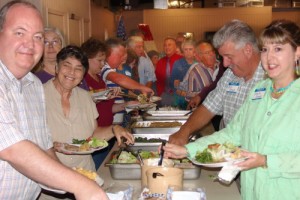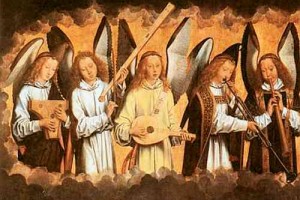I became what some might call a Calvinist my junior year in High school. Going to a Dutch Reformed private school where I took a “Reformed Perspectives” class certainly aided this process. I had resisted of course. Coming from a Non-denominational Bible church, I had a gut reaction against such notions of predestination and all that depravity and sovereignty talk. However, the day came when my heart was changed and I suddenly found myself agreeing with this new and strange Reformed theology. Unfortunately, this was about the same time that I became a complete jackass. Worse, this behavior would continue for a few years.
The Young, Restless, and Reformed Movement (YRR) has been slowly aging, changing, and now it appears that it is also dying. Fortunately, this is a good thing. This “movement” was much more marked by its restlessness than by its Reformed theology. It took me years to come to a place of understanding what exactly is meant by Reformed Theology, and most people on the fringe of this Calvinistic ideology are only considering its soteriological concerns. Yet, it was marked by something—restlessness This was in reference to being dissatisfied with current church practices and doctrine. Looking back, we can observe that although it may have started out that way, it quickly turned to a restlessness better described as angst.
Calvinism was freshly unleashed through the YRR. People from all types of denominations began immersing themselves into the Reformed tradition, unearthing names like Edwards, Owen, Pink, Kuyper, Spurgeon, and Calvin of course. Some of these names who have very notable influence on many had been untouched by decades in many traditions. With this type of Calvinism came also the restlessness of the YRR. We weren’t being exposed to Calvinism and the reformed tradition purely, but a particular form of it—with it, an entire culture came free of charge. Angst was a disease and “Cocky Calvinist” was the street name. The Gospel of the Reformed Tradition, bathed in its emphasis on total depravity and God’s ultimate glory in all things, began to create disunity in the church. TULIP unfortunately became a shibboleth against the un-Reformed. Debates over free will and divine sovereignty have been the point of contention in this fight, and a lot of innocent people have been the collateral damage in this theological civil war.
After I became a Calvinist, I began to devour the contemporary theologians so as to better immerse myself in the culture. Piper, Driscoll, Chandler, Keller, and Sproul were just some of them. Blogs like The Gospel Coalition, Desiring God, White Horse Inn took over my browsing history. It was through these outlets, and others, that Reformed theology came alive in me. Yet, the more I learned the more divisive and restless I became. I argued with many of my friends, mentors, and I even became contemptuous towards my youth pastor. In college, I sadly was never able to reconcile the Arminianism of my roommates. I severely hurt my sister who was struggling with these concepts at the time. These debates consumed my thinking and conversations. It wasn’t just the doctrines though, it was that whole angst that came with it. To be a “real” Christian, one that really read their Bible, you had to be a 5 point—TULIP loving—institutes reading—podcast listening—“tabletalk” subscribing—strict traditional gender roles adhering—doctrine debating—let’s name our kids after dead theologians— Calvinist. You were saved by grace through faith, but you were sanctified by Calvinism.
This type of Calvinism is dying. The years of the Young Restless and Reformed are over, or at least will be in very near future. Many factors can be attributed to the end of the age of angst but there are a few notable ones.
First, I believe that the rise of Homosexuality, particularly on the issue of Gay marriage, was a major catalyst for the end of the Calvinist angst. This issue, which is chock-full of complexity, has forced Christians to unite. Calvinists and Non-Calvinists alike have faced this issue and have had to learn tact and gentleness in their presentation of their conclusions. I think that this issue has softened the hearts of many pastors as they have realized the brokenness of the human condition and the complexity of the issue. We have realized that we don’t have the time to fight amongst ourselves.
Secondly, Tullian Tchividjian’s departure from The Gospel Coalition, was a huge catalyst for the death of Calvinism. It showed that the angst of the YRR could turn on their own. Tchividjian had disagreed doctrinally with some of the other members of TGC, and eventually he was asked to leave. This type of Calvinism is divisive even among its own leaders.
Lastly, the final nail in the coffin of the YRR movement was the controversy over Pastor Mark Driscoll and the eventual closing of the Mars Hill network of churches. A lot could be said, especially since I served in leadership in Orange County until we closed the doors, but that must be for another time. The main issue is that practice became the crucible, not doctrine. It was Driscoll’s actions, not beliefs, that led to his downfall. The angst over strong masculinity, reformed theology, and church growth, became points of contention to others. This angst produced malpractice, which ended up hurting a lot of people.
The years of YRR are over, and this is a good thing. By God’s grace, a revival of reformed theology produced a lot of great things. It made us sharpen our convictions, think critically about our theology, and in turn, it caused us to focus on Jesus and his Gospel. These things must continue, but we must leave the restlessness behind. We have learned over these past few decades that theology is very important, but it must be connected with right practice. We have also learned that the world is really broken and supremely in need of the Gospel. We don’t even have the time to be angsty about supra or infralapsarianism. Instead, we should spend the time reaching out to our neighbors who don’t yet know Jesus.
I see two things in this next phase of Christianity in America. First, ongoing reflection regarding beliefs and our theology will be a hallmark of all Christians. I pray that the vast majority of denominations would continue to be critical thinkers.
Second, Church unity would be held higher than tertiary concerns. Instead of being angsty about our distinct theological differences, we must be passionate for our unity. I pray that the church seeks to be united in Christ as we come around the celebration and proclamation of the Gospel.
The Age of Angst is over. We have seen how it has devoured our own leaders, our own people, and has done nothing for those who aren’t our people. This type of Calvinism is dead. What stands on the horizon is a better type of Church, one that has both convictions and unity.





3 Comments
Leave your reply.